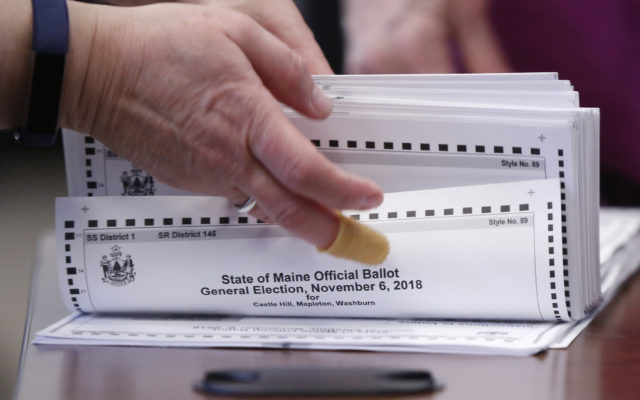
Maine lawmaker wants to prevent blank ballots from forcing ranked-choice runoffs
By Billy Kobin, Bangor Daily News Staff
The ranked-choice count that confirmed U.S. Rep. Jared Golden’s victory in Maine’s 2nd District took extra time and money, and a state lawmaker wants to change rules around blank ballots to avoid that in the future.
Rep. David Boyer, R-Poland, said he filed a bill for the next legislative session to not require a ranked-choice count in a two-person race if one candidate does not receive at least 50 percent of votes due to blank ballots. Boyer also said he thinks a runoff is not needed if the number of votes received by a declared write-in candidate is not enough to defeat the winner.
It’s a response to the strange race between Golden and state Rep. Austin Theriault, R-Fort Kent, that saw a ranked-choice count stretch into a fourth day last Friday. That evening, Maine Secretary of State Shenna Bellows confirmed that the Democratic incumbent received 50.35 percent of votes to 49.65 percent for Theriault, who has also asked for a recount.
Golden declared victory a day after the Nov. 5 election following the Bangor Daily News and Decision Desk HQ calling the race for him. Bellows then said a ranked-choice count was needed because neither candidate got more than 50 percent of votes in the initial count when including 12,635 ballots that did not indicate a first choice and were considered blank.
The race was also complicated by an official write-in candidate, Diana Merenda of Surry, who got 420 votes after focusing her campaign on opposing America’s financial support of Israel’s military actions. Golden led Theriault by about 2,150 votes after the first round of counting, and his margin expanded to roughly 2,700 after the ranked-choice tally.
Ranked-choice races typically involve at least three candidates whose names appear on the ballot, but Merenda’s name was not on the ballot as a write-in choice. If no candidate receives at least 50 percent of votes, then a runoff eliminates the last-place candidate while tabulating the second-choice votes for candidates to determine the winner.
Under state rules in place since Maine began using the ranked-choice method in 2018, voters can rank as many or as few candidates as they would like. Those who only rank a second choice have their votes initially recorded as blank. If the race goes to a ranked-choice count, those second choices are counted as first choices.
Boyer said he is not sure that he wants to tweak the rules on blank ballots with no first choice and subsequent rankings. He thinks Merenda’s vote total is proof she would not have significantly changed Golden’s lead and that his solution balances practicality with letting write-in candidates “get their voices heard.”
“It’s a bad use of tax dollars when it’s clearly a two-person race,” Boyer said.
Merenda said she opposes Boyer’s proposal. She said the current ranked-choice system “is the will of the people, and that is how it should work.”
Ranked-choice voting has been a sore spot for Maine Republicans since Golden unseated former U.S. Rep. Bruce Poliquin in 2018, erasing a first-round deficit thanks to his second-choice support from backers of two independent candidates. Since then, Democrats have generally backed the voting method while Republicans oppose it.
Bellows spokesperson Emily Cook said Tuesday her office would want to see Boyer’s bill before taking a position on it. Boyer, who serves on the Legislature’s elections committee, said he has spoken with several Democratic colleagues who he thinks are open to considering his idea.
“I’m not opposed to the idea if it’s in line with what our current laws are, but I want to hear from the secretary of state’s office,” Rep. Laura Supica, D-Bangor, said.